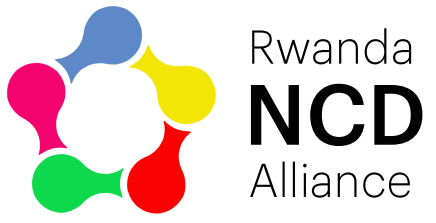Before Rwanda’s proactive stand against NCDs, there was a critical leadership gap at the grassroots. I saw this firsthand, noticing a scattered response where NCDs were often overshadowed by infectious diseases. NCDs were not among the priorities. There was no unified platform or voice to coordinate efforts, share best practices, or push for policy change. This lack of strong community leadership led to stalled progress, missed opportunities, and a general decline in the community’s quality of life, meaning communities often lacked the information and resources needed to prevent and manage conditions like diabetes or heart disease. The impact on families was substantial. Recognising this void, a small group of us came together with a clear goal: to create a new infrastructure for NCD advocacy and action. This marked the beginning of the Rwanda Non-Communicable Diseases Alliance, a direct response to a gap we knew needed filling to build a healthier future for all Rwandans.
Rwanda, a nation celebrated for its remarkable progress in development and healthcare, is now strategically positioning itself on the frontlines of a new global health battle: Noncommunicable Diseases (NCDs). As the burden of conditions like cardiovascular disease, diabetes, cancer, and chronic respiratory illnesses continues to rise worldwide, Rwanda is not merely reacting but proactively cultivating a self-care mindset and ownership in the community, with local leaders standing ready to champion the cause of prevention, control, and care across the country.
The fight against NCDs is complex, requiring far more than clinical interventions. It demands multi-sectoral action, robust policy frameworks, sustained public awareness, and innovative community engagement. This is precisely where informed and empowered leadership becomes vital. NCD-ready leaders developed in Rwanda understand the interconnectedness of health with other sectors – from education and urban planning to agriculture and economic development. They are equipped to champion healthy living and advocate for healthy public policies, mobilise resources, foster partnerships, and drive behavioural change at scale.
Rwanda has recognised this imperative and has diligently invested in building the capacity of its professionals and community figures. Through targeted training programmes and integrating NCD awareness into existing health initiatives, the nation is nurturing leaders at every level. These are not just medical practitioners, but also policymakers, educators, local government officials, community health workers, and civil society advocates. They are being empowered with the necessary knowledge, skills, and tools to identify risk factors, promote healthy lifestyles, facilitate early diagnosis, and ensure access to quality care.
- In a direct response to the increasing burden of NCDs and mental health issues, the Government of Rwanda has launched a dedicated Wellness at Workplace programme designed to improve the health of its workforce. This is a strategic move to improve employee health, boost productivity, and save on healthcare costs. By making wellness a priority at work, the country is investing in a healthier, more productive, and more stable workforce.
- Imagine a city where the roads belong to people, not cars. That's a reality in Rwanda on its bi-monthly Car Free Day. This initiative brings citizens together for a massive sports event designed to fight NCDs and clean the air. Beyond the roads, a strong network of leaders has ensured since 2016 that this focus on wellness continues year-round.
- Rwanda's civil servants are entitled to a two-hour fitness programme every Friday afternoon, with work officially ending at 3 pm instead of the usual 5 pm. This nationwide initiative is intended to promote a healthier lifestyle and prevent NCDs among government employees.
However, the journey is ongoing. Challenges persist, including limited resources, the need for enhanced data collection, and deeply ingrained societal habits. Yet, the presence of these dedicated leaders provides immense optimism. Their commitment extends beyond professional duty and is often fuelled by a personal understanding of NCDs’ impact on families and communities. This human-centred approach ensures that the fight against NCDs remains empathetic and relevant to the daily lives of Rwandans.
In essence, Rwanda is not waiting for NCDs to overwhelm its health system. Instead, it is building a capable human infrastructure to confront them head-on. The NCD-focused leaders standing by in Rwanda are a testament to the nation’s foresight and its unwavering dedication to securing a healthier future for all its citizens. They embody the spirit of resilience and progress that defines the country, ready to lead the charge towards a healthier and NCD-free generation. Furthermore, they are spearheading awareness campaigns, empowering Rwandan citizens with the knowledge to make informed choices for their health and well-being. (You cannot be a champion or lead in what you do not know.)






